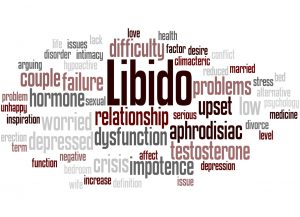
Dr. Jeff Foster explained, “In men, testosterone increases from puberty up until the age of 30, when it is generally accepted that there is a decline of about one percent production per year. This is an average, however, and the studies seem to show anything from 0.4 – two percent. If your testosterone levels were naturally at the higher end of normal, you may never notice them drop.
However, if your levels are at the lower limit, it may not take many years before age-related testosterone deficiency shows a clinical effect.”
Symptoms related to low testosterone include tiredness, greater fat in the abdomen area, decreased sport performance, loss of sex drive, erectile dysfunction, depression, and poor memory. Essentially, you simply won’t feel like yourself when your testosterone is low.
There is a simple yes or no test known as the ADAM (Androgen Deficiency in the Aging Male) test which can provide you with some insight as to whether or not your testosterone is on the lower side.
Simply answer YES or NO to the following questions:
- Do you have a decrease in libido (sex drive)?
- Do you have a lack of energy?
- Do you have a decrease in strength and/or endurance?
- Have you lost height?
- Have you noticed a decreased enjoyment of life?
- Are you sad and/or grumpy?
- Are your erections less strong?
- Have you noticed a recent deterioration in your ability to play sports?
- Are you falling asleep after dinner?
- Has there been a recent deterioration in your work performance?
If you answered YES to questions 1 and 7 OR answered yes to three or more of the questions, then you may need to speak to your doctor about having your testosterone levels checked, which can easily be done through blood work.
If you do have low testosterone, there are different options your doctor can recommend to get levels back up again, from injections and gels to patches and even implants.
To boost your testosterone naturally, ensure you sleep well, eat enough protein, don’t drink too much alcohol, and exercise regularly.
Also read:
- 19 foods that lower testosterone levels
- 7 surprising foods that boost libido
- 10 foods that increase estrogen levels naturally